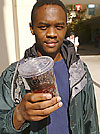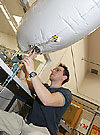


|

|
|
Wednesday, December 1, 2004
|
 AIDS funding falls short
AIDS funding falls short
Students protest lack of worldwide AIDS education funding
Vital funding for the Global AIDS Fund will not meet its expected goal due to budget constraints of other countries that could not match the $550 million the United States pledged.
UA students from the Student Global AIDS Campaign are upset with Rep. Jim Kolbe, R-Ariz., for not delivering the full amount after he promised to secure the funds.
[Read article]
|
|
 Unions may begin serving fair trade coffee blends
Unions may begin serving fair trade coffee blends
A UA student club might get its wish for the university to serve fair trade-certified coffee sooner than it expected.
Members of Students for Fair Trade are requesting the UA Dining Services provide fair trade coffee, a request dining services representatives are seriously considering upon receiving more information about the coffee from Seattle's Best Coffee, the UA's coffee supplier.
"I think we're going to get a good response," said Victoria Christie, associate director of Dining Services.
[Read article]
|
|
|
Many ex-profs blame flight on poor state Legislature funding
Editor's note: This is the second article in the two-part series on the UA "Brain Drain" problem.
Many professors who have left the UA for other universities say a lack of support from the state Legislature prompted their decision.
Dubbed "brain drain," the loss of talented faculty members to private institutions has become a serious problem at the UA, said President Peter Likins.
A several-year delay in the new addition to the Old Chemistry building prompted four leading UA scientists to leave last year for the Georgia Institute of Technology. The addition broke ground a few months ago.
[Read article]
|
|
 Students learn hard lessons from DUI arrests
Students learn hard lessons from DUI arrests
People between the ages of 17 and 26 are involved in the majority of drunken driving arrests and UA students make up a significant number of DUI arrests in the campus area, according to police.
When students get pulled over
Johnathan Tarkowski, political science junior, was arrested at the beginning of the semester and charged with being a minor in possession of alcohol while driving.
[Read article]
|
|
 Assistant prof hopes to give robots vision
Assistant prof hopes to give robots vision
Today's robots work in car factories tirelessly, defuse bombs and explore hostile environment on other worlds - but they're all about as blind as bats.
Though scientists have been working on the robotic eye for decades, Charles Higgins, assistant professor in the UA Department of Electrical and Computer Engineering, is breaking new ground with an innovative approach to robotic visual navigation: neuromorphic engineering.
[Read article]
|
|
 Fast facts
Researchers at the University of Manchester have made the world's first single-atom-thick fabric, which reveals the existence of a new class of materials and may lead to computers made from a single molecule. They call it "graphene," because it's "webbed" by extraction of individual planes of carbon atoms from graphite crystal.
In the 1960s, animal behavior researchers studied the effects of various substances on spiders. When spiders were fed flies injected with caffeine, they spun very "nervous" webs. When spiders ate flies injected with LSD, they spun webs with wild, abstract patterns. Spiders that were given sedatives fell asleep before completing their webs.
[Read article]
Fast facts
Researchers at the University of Manchester have made the world's first single-atom-thick fabric, which reveals the existence of a new class of materials and may lead to computers made from a single molecule. They call it "graphene," because it's "webbed" by extraction of individual planes of carbon atoms from graphite crystal.
In the 1960s, animal behavior researchers studied the effects of various substances on spiders. When spiders were fed flies injected with caffeine, they spun very "nervous" webs. When spiders ate flies injected with LSD, they spun webs with wild, abstract patterns. Spiders that were given sedatives fell asleep before completing their webs.
[Read article]
|
|
|
|
